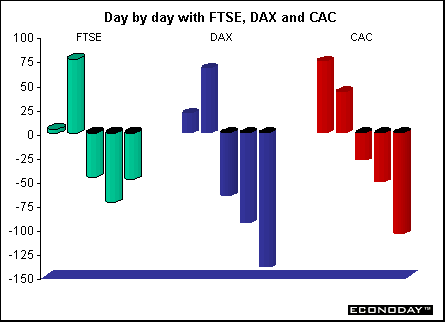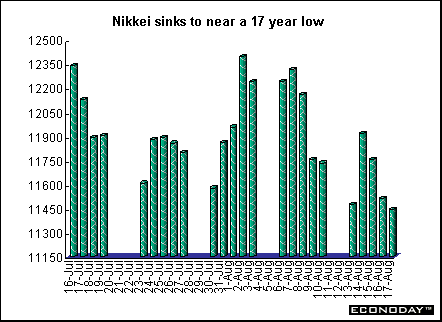
Europe and Britain
Key indexes followed here completed another nightmarish week. Initial optimism on Monday and Tuesday gave way quickly to negative thinking imported from the United States. Despite favorable economic data in Britain (see indicator scoreboard below) investors focused on the stream of dreadful earnings reports and planned corporate employment cutbacks. U.S. pessimism once again flowed across both oceans to Europe and Asia. Indexes plummeted and everyone was relieved to go home on Friday.

Asia
The fall of the Nikkei 225 Stock Average to a nearly 17 year low illustrates the role foreigners have come to play in Japan's market: When foreigners are not buying - as is the case now - the market is prone to sharp drops. Foreign investors own 19 percent of the total value of Japanese stocks but generally account for around 35 percent of trading value. That means they have a greater weight when it comes to moving markets, and recently the direction has been down. According to the Ministry of Finance, foreigners sold 471 billion yen ($3.86 billion) more in stocks than they bought in June after being net buyers earlier this year. The Tokyo Stock Exchange says foreigners were net sellers in July to the tune of 22 billion yen on Japan's three major exchanges.

The Bank of Japan unexpectedly said they would increase purchases of government debt to pump more money into the economy and stem the recession. The BOJ pointed to the recent tumble in stocks prices and its possible adverse effect on the economy as well as the drop in exports and the resulting negative effect on production. The BOJ has been under heavy political pressure to ease even though interest rates are already at zero. The ball is back in the government's court to make the necessary structural reforms and provide a healthier foundation for growth. Japanese growth is expected to decline for a second consecutive quarter when data are released next month. The Nikkei initially soared on the BOJ news, but by week's end had lost Tuesday's gain and then some.
Even without the weak economy, many domestic investors would be looking to sell stocks. Banks are trying to clean up their balance sheets ahead of the introduction of mark to market accounting for the first half of the fiscal year, which ends September 30. The new accounting standards mean that banks have to record the actual value of their shareholdings on their balance sheets, rather than the value at the time of acquisition. Banks are looking to postpone the accounting change because equities are so depressed.


Introduction • Global Stock Market Indexes • Recap of Global Markets • Currencies • Indicator Scoreboard

The Bottom Line • Looking Ahead
|